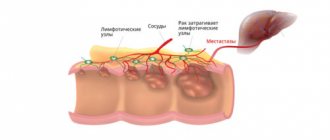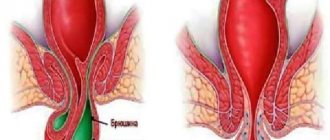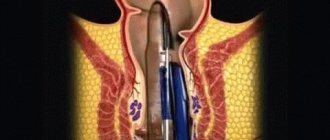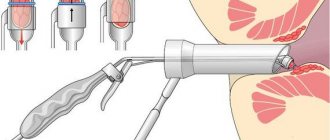Why do hemorrhoids occur?
A person has an increased risk of developing hemorrhoids even at a young age if the following factors are present:
- chronic constipation
- passive lifestyle
- professional risk - builders, drivers, office workers, accountants, programmers, salesmen
- lifting weights
- passion for various diets
- pregnancy and childbirth
- some sports
- genetic disposition
- abuse of alcohol, fatty, spicy foods
Diagnosis of the disease by a specialist
Knowing which doctor specializes in treating the pathology of hemorrhoidal veins and having discovered the corresponding symptoms, a patient who takes responsibility for his health puts aside awkwardness and comes for an examination to a proctologist. To confirm or refute suspicions of hemorrhoids, the doctor has a whole arsenal of methods that make it possible to accurately diagnose it.
- To begin with, the doctor will find out what exactly the patient is complaining about, clarify what pathologies his closest relatives suffered from, what diseases have already been diagnosed in the patient himself, allergic reactions to medications. The doctor will also ask about the patient’s profession and sexual preferences. It is important to answer these questions candidly, as the information will assist the physician in selecting successful therapy.
- After collecting anamnesis, the doctor examines the patient visually and by palpation. An examination of the abdomen is carried out in order to identify a possible tumor of the colon, spasm of parts of the intestinal tube, and to exclude an exacerbation that requires surgical intervention.
- External examination of the anus allows you to detect microcracks and prolapsed hemorrhoids. Checking the rectum shows nodes, polyps, narrowing of the anus, and allows you to assess the condition of the prostate in men. If abnormalities in the condition of the prostate gland are detected, the proctologist will advise you to consult a urologist.
- To check in more detail the condition of the internal walls of the rectum, instrumental diagnostic methods are very often used - sigmoidoscopy (or rectoscopy) and colonoscopy. The purpose of these procedures, carried out using special equipment, is to obtain diagnostic information about the condition of the intestines. The functional features of the devices are different. The colonoscope, unlike the sigmoidoscope, which has a rigid tube, is flexible and has a much longer length. This allows it to penetrate the colon, around its natural curves and loops. Thus, the colonoscope has an advantage in the depth of penetration into the intestinal cavity of the patient being examined.
If necessary, the proctologist can refer the patient for tests to check blood, feces, and urine. Sometimes there are indications for prescribing an electrocardiogram or FGDS (endoscopic examination of the upper gastrointestinal tract).
Which doctor should I go to for hemorrhoids?
When a person begins to worry about bleeding from the anus, the formation of any nodes in the anus, he wonders if this is hemorrhoids? And what kind of doctor treats hemorrhoids? Today, in the age of a sedentary lifestyle, everyone should be aware of the most characteristic symptoms of this disease.
The main sign of incipient hemorrhoids is bleeding from the anus from slight to intense, prolapse of hemorrhoids, discomfort when sitting and walking, and there may not be severe pain. If any bleeding from the anus or traces of blood in the stool appears, you should contact a proctologist or coloproctologist as soon as possible.
Therefore, when the question arises: for hemorrhoids, which doctor should you go to? The clear answer is to see a coloproctologist or proctologist. Only a specialist, after conducting a thorough examination, will be able to determine the true cause of the bleeding. You should also know that hemorrhoids successfully disguise themselves as other diseases of the rectum, such as anal fissures, malignant tumors and other serious diseases.
When to rush to the proctologist
a reason to consult a doctor:
- the appearance of nodes in the anal canal area (they can be detected by palpation);
- prolapse of hemorrhoids through the anus to the outside;
- bleeding during bowel movements;
- pain that appears during bowel movements and continues after it ends;
- feeling of itching, burning, discomfort in the anorectal area;
- sensation that there is a foreign body in the rectum.
If one or more such clinical manifestations occur, you should not delay making an appointment with a specialized doctor or local physician in order to establish an accurate diagnosis. Treatment for varicose veins of the rectum should begin immediately. If you ignore the symptoms or self-medicate, the disease will progress quite quickly and go into more severe stages. To get rid of the pathology, you still have to turn to doctors. But in the later stages, there is a high probability that conservative treatment will no longer be able to help, and the only option will be surgery.
What does a coloproctologist treat?
Until recently, a doctor who treated hemorrhoids and other diseases of the rectum was called a proctologist. In the modern nomenclature of specialties among doctors, diseases of the colon have been included in the competence of a proctologist, so now a doctor who treats hemorrhoids is called a coloproctologist.
How to prepare for a doctor's examination?
Before a visit to the proctologist, you should cleanse the intestines 1 time in the evening, 1 time in the morning, the most effective way is to give an enema. There are other options - a microenema with the drug Microlax, which should be done on the day of the visit in the morning. Such preliminary preparation is required if the doctor deems it necessary to perform rectoscopy.
Can there be hemorrhoids without blood?
It happens in the initial stages, but bleeding is one of the signs of hemorrhoids; even with internal hemorrhoids there can be heavy bleeding. But this is not the only symptom of the disease.
Can hemorrhoids go away on their own?
No. Hemorrhoids not only cannot disappear on their own, they tend to enlarge. Drug therapy slightly slows down the progression and relieves symptoms in the acute process.
Is pain inevitable after hemorrhoid surgery?
Today, there are modern methods of minimally invasive surgical treatment of hemorrhoids, which provide relief from this disease without pain and subsequent problems.
If you have pain in the anus, what is the diagnosis of hemorrhoids?
No. Hemorrhoids are not always painful; in the initial stage of the disease there may be no pain, only in the advanced stage, when inflammation occurs, nodes fall out, and acute pain occurs. There can be many reasons for the appearance of various pains in the anus, so timely diagnosis by a proctologist - a doctor who treats hemorrhoids - is important.
Is an examination by a coloproctologist always painful?
When examined by a proctologist, pain can only occur if there are associated problems - tears, cracks, prolapse of nodes. A standard examination by a proctologist is painless.
Are hemorrhoids a disease of older people?
No. In modern society, hemorrhoids occur in the younger generation under 30 as often as in those over 45. Often, the first signs of hemorrhoids appear in most people at a fairly young age, progressing and intensifying in the future.
Can hemorrhoids be treated with laxatives?
No, getting rid of constipation is not a cure for this disease; moreover, getting rid of diarrhea and intestinal irritation - the symptoms and progression of the disease only intensify.
Treatment methods for hemorrhoids
For hemorrhoids in men and women, after diagnosis, the doctor immediately suggests treatment methods.
There are several types of treatment:
- Conservative - with the help of medications that not only alleviate symptoms, but also treat the problem itself.
- Minimally invasive and surgical - involve removing nodes using one or another method.
The opinion of doctors regarding treatment tactics depends on the stage of hemorrhoids and the presence of concomitant diseases.
Conservative methods are usually used, and only the last stages require surgical manipulation.
What the doctor can prescribe:
- Rectal suppositories (for example, sea buckthorn suppositories, Relief, etc.).
- Tablets and capsules (Troxerutin, Detralex, etc.).
- Cream, ointment, gel for hemorrhoids (musk ointment, Venarus, Vishnevsky ointment, Zdorov wax cream).
- Treatment of hemorrhoids with menovazine.
- Other remedies (the most popular and effective: Gemoderm anti-hemorrhoid spray, Chinese patch, etc.).
Minimally invasive treatments include:
- Sclerotherapy. Introduction of a special substance into the nodes, which causes the nodes to die. Ligation with latex rings. Rings are placed on the nodes, which disrupt blood circulation in the problem area - and it disappears.
- Photocoagulation. Under the influence of thermal energy, the node dies, and a wound forms in its place.
Minimally invasive treatment methods do not require anesthesia or general anesthesia. At the last stage, minimally invasive methods do not always give results - and a classic operation to remove hemorrhoids is performed, which is performed under general anesthesia. Doctors' orders should never be ignored, even if a standard operation to remove nodes was recommended.
How should hemorrhoids be treated?
We found out which doctor treats hemorrhoids, now we have to find out how this disease can be cured today? Only a qualified doctor can prescribe adequate, timely, modern treatment. In practice, there are no absolutely identical cases; each patient has certain symptoms, aggravated by other proctological problems and chronic diseases, so treatment is prescribed strictly individually, depending on the nature of the process and the stage of hemorrhoids. Today, in addition to traditional surgical and drug treatment, there are such modern methods of treating hemorrhoids on an outpatient basis as:
- sclerotherapy,
- photocoagulation of hemorrhoids,
- application of latex rings - ligation
- Abroad, only a quarter of patients undergo surgical treatment, and the remaining 75% of patients undergo minimally invasive, painless treatment for hemorrhoids.
Author:
Selezneva Valentina Anatolyevna physician-therapist
Diagnosis and treatment
To determine the stage and form of hemorrhoids, a specialist can use the following diagnostic methods:
Palpation. The coloproctologist carries out this diagnosis at the first appointment, when the anorectal area is examined using the fingers.
- Sigmoidoscopy. This method allows you to accurately determine the progress of the disease. It uses special equipment that allows you to examine the rectum and lower part of the sigmoid colon from the inside.
- Anoscopy. Using an anoscope, an internal examination of the lower intestine is performed.
- Colonoscopy. Aimed at diagnosing the inside of the large intestine.
In parallel with instrumental methods, the patient will need to have stool and blood tested.
Depending on what the results show, the coloproctologist may prescribe one or another treatment. In order to alleviate the patient’s condition, the doctor performs the following manipulations:
If hemorrhoids are in the acute stage, conservative treatment methods are used. Since the patient constantly experiences pain in the anus, he is given general and local anesthesia. For such purposes, Ketonal, Diclofenac or Movalis can be used. Anti-inflammatory drugs are prescribed, which can be used in the form of dressings treated with ointment (Vishnevsky ointment, “Gepatrombin”), or in the form of tablets for internal use.
If the patient experiences bleeding, they are treated with adrenaline-containing suppositories.
For stages 1 and 2 of hemorrhoids, minimally invasive methods are used. But if there are cracks, thrombosis or inflammatory processes in the perineum, the doctor should not prescribe such treatment.
In advanced stages and chronic forms, more radical methods of treatment are used - sclerotherapy, photocoagulation, cryodestruction, infrared coagulation and ring ligation. Each method involves its own effect on hemorrhoids.
If none of the above methods help, the patient is referred for surgery.
A few recommendations
Regardless of the scale of the disease, a man’s diet must be adjusted so that his meals contain fiber. It is also worth giving up products that strengthen for a while.
To prevent the disease from returning, it is worth remembering the following recommendations:
- if the work involves constant sitting, it is necessary to take short breaks for physical exercise;
- a daily shower with thorough washing of the anorectal area is mandatory (preferably with cool water);
- control your diet;
- immediate response in situations of constipation;
- in the evening and in the morning you need to perform exercises to train the pelvic muscles.
If you experience any discomfort in the anorectal area, you should immediately ask which doctor to contact. Otherwise, such a disease can lead to bleeding from the rectum, blood clots and paraproctitis, when rotting of nearby tissues begins. All these complications not only bring discomfort to the patient, but also pose a certain threat to life. Therefore, maybe it’s still worth putting aside your embarrassment and making an appointment with a coloproctologist? After all, your own health is more valuable.











